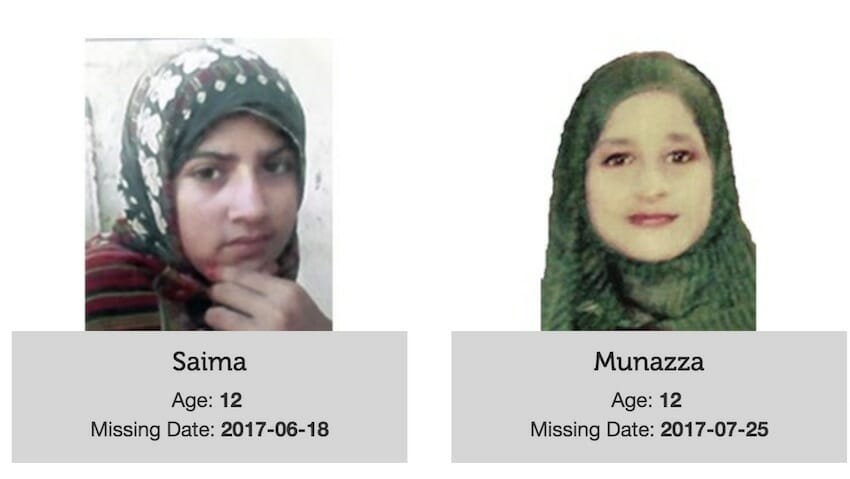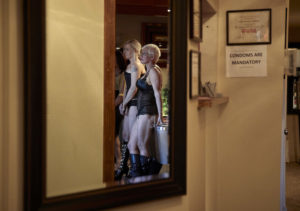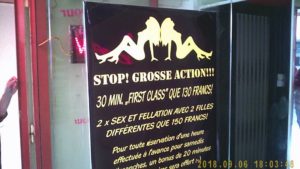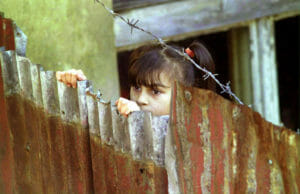Case of Missing Pakistani Children Is Also About Corruption
A devastating case is bringing Pakistan's biggest social and political issues—police corruption, patriarchal injustice—to the fore once again. A section of Pakistani NGO Roshni Helpline's website features images of missing children. (Roshni Helpline)
A section of Pakistani NGO Roshni Helpline's website features images of missing children. (Roshni Helpline)
Editor’s note: This article, originally published Sept. 28 in the Pakistani newspaper Dawn, was written by Truthdig contributor and leading Pakistani journalist Zubeida Mustafa. Read a collection of Mustafa’s work, including her pieces in the series Global Voices: Truthdig Women Reporting, here.
KARACHI, PAKISTAN — The police force in Pakistan’s Sindh province is under fire, which is not something unusual as its performance can hardly be described as satisfactory. It is also alleged to be notoriously corrupt.
A fortnight ago, the Sindh chief justice rebuked the defenders of the law for their failure to recover 22 children who had been missing for several years. An NGO, Roshni Helpline, had filed a petition in the Sindh High Court on behalf of their parents.
In spite of the directive, the police had not set up a team to look into each case.
This news report touched a raw nerve and pained me immensely. My experience with the police in the last six months has been similarly frustrating. We (the widowed mother of two kidnapped minor girls and I) have been running from pillar to post to get justice.
It is our tragedy that people generally tend to turn away when they learn of a case of young girls being trafficked for prostitution. In the absence of any clue, I fear this might be the fate of the two girls mentioned above as well.
Is it embarrassment at anything to do with sex? Or a patriarchal mindset that perceives sex as a man’s right? Or the belief that all women who are trapped in such a situation are evil and that they deserve their terrible fate? Many might call this a national trait.
There has been no uproar when such cases have been exposed as on the present occasion by Roshni Helpline. In rare cases, men and women of conscience have spoken up especially when they had something to narrate from their own experience, as described in my last column on this subject on Aug 3.
Today, I will quote Nasreen Azhar, our well-known feminist and human rights activist and former member of the National Commission on the Status of Women.
This is what she has to say: “A young man, a friend, phoned me a year ago to ask for help in a case where a girl of 16 had been kidnapped from the bus stop and forced to work for a brothel. She had been picked up by a woman pretending to be helpful and had been handed over to another woman in a house in the adjoining rural area.
“As can be expected, she was locked up and beaten every time she tried to escape. She was forced to service clients who were sent to her. Luckily, a client felt sorry for her when he heard her story. He phoned her brother who came with several relatives and rescued her. But her family did not want to pursue the case because of their ‘izzat’.
“I had been given the girl’s phone number so I called her up. I assured her that I was a friend and would not disclose her identity to anyone. My aim was to have the people who ran the brothel punished. She hesitantly told me what had happened and offered to give the location and address of the place where she had been held captive, along with two or three other girls at the time.
“So I phoned my young friend who had told me about this case, and he promised to speak to a senior police officer who he knew. I kept following up with phone calls but nothing came of it. The police officer was transferred and I was told that the girl herself would have to lodge the FIR [first information report].
“When I insisted that the police had at times raided brothels in posh Islamabad areas when only neighbors had complained, there was no response except for vague promises. It is obvious that raids in posh areas are lucrative for the police in terms of the payments they receive. But where poor women and girls are concerned it is not considered worthwhile. I still feel guilty that I was not able to do more for this poor child.”
What Nasreen narrates is the sad story repeated day after day all over the country when someone with a little clout gets involved. The U.S. secretary of state’s Report on Trafficking in Persons (Pakistan) speaks of police complicity with the criminals. When poor girls have been picked up, in most cases the families lack the clout or even the will to have their daughters rescued.
These girls become a rich source of earning for the pimps and also their protectors, the police, who are handsomely tipped to “make vague promises and do nothing”, as happened in the case Nasreen narrates.
Telephones remain unanswered and sooner rather than later the rare police officer who is trying to be helpful is transferred. The story sounds familiar. It is repeated in every case taken up. I can almost hear the sigh when Nasreen concludes her email with these words, “Tragic, the things that go on in our country!”
Your support matters…Independent journalism is under threat and overshadowed by heavily funded mainstream media.
You can help level the playing field. Become a member.
Your tax-deductible contribution keeps us digging beneath the headlines to give you thought-provoking, investigative reporting and analysis that unearths what's really happening- without compromise.
Give today to support our courageous, independent journalists.








You need to be a supporter to comment.
There are currently no responses to this article.
Be the first to respond.